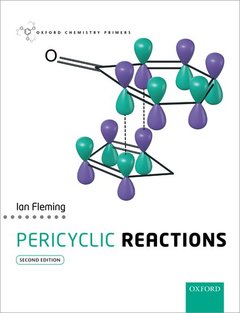Description
Pericyclic Reactions (2nd Ed.)
Oxford Chemistry Primers Series
Author: Fleming Ian
Language: English
Subject for Pericyclic Reactions:
Publication date: 04-2015
128 p. · 19.4x24.6 cm · Paperback
128 p. · 19.4x24.6 cm · Paperback
Description
/li>Biography
/li>
The renowned Oxford Chemistry Primer series, which provides focused introductions to a range of important topics in chemistry, has been refreshed and updated to suit the needs of today's students, lecturers, and postgraduate researchers. The rigorous, yet accessible, treatment of each subject area is ideal for those wanting a primer in a given topic to prepare them for more advanced study or research. Moreover, cutting-edge examples and applications throughout the texts show the relevance of the chemistry being described to current research and industry. Learning features provided in the primers, including questions at the end of every chapter and interactive online MCQs, encourage active learning and promote understanding. Furthermore, frequent diagrams, margin notes, further reading, and glossary definitions all help to enhance a student's understanding of these essential areas of chemistry. Pericyclic reactions constitute a major strand of organic chemistry, including such commercially important synthetic reactions as the Diels-Alder reaction. Reactions such as these are characterised by their predictable stereochemistry and cyclic transition structures. This primer reviews these reactions, explaining their theoretical basis via correlation diagrams, and showing students how to recognise the different types of pericyclic reaction, their mechanisms, and applications to organic synthesis.
Ian Fleming studied at Pembroke College, Cambridge, obtaining his PhD in 1962 in the University Chemical Laboratory supervised by Dr John Harley-Mason. After a year of independent research as a Research Fellow in Pembroke College, he spent a postdoctoral year at Harvard (1963-1964) with Professor R. B. Woodward, before returning to Cambridge, where he was successively Assistant Director of Research, Lecturer, Reader, and Professor of Organic Chemistry. In 1993 he was elected as a Fellow of the Royal Society in recognition of his work on the application of organosilicon chemistry to solving problems of regiocontrol and stereocontrol in organic synthesis. He formally retired from research in 2002, but remains active in writing and teaching.
© 2024 LAVOISIER S.A.S.




